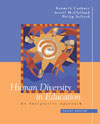 |  Human Diversity in Education: An Integrative Approach, 4/e Kenneth H. Cushner,
Kent State University, Kent
Averil McClelland,
Kent State University, Kent
Philip Safford,
Case Western Reserve University
Religious Pluralism in Secular Classrooms
Chapter OverviewBecause the United States was founded on the principle of religious liberty, the framers of the Constitution built into the First Amendment both a prohibition against a state religion and a prohibition against limiting the free expressing of religious beliefs and practices. That ambiguity has led to considerable dispute over the role of religion in American society and particularly in American schools. The principle of separation of church and state has not prevented many people from believing that schools should be a repository of morality; the question has always been, "Whose morality are we talking about?" Because we are a nation of laws, much of the "action" regarding religion and schooling has been in the courts, which have struggled with this issue over the years, often reversing previous decisions, but always trying to come to a reasonable balance between competing views. This balance has been impeded by the myth that teachers may not talk about religion in schools; this myth is not true. Indeed, the decision that "banned" school prayer explicitly notes that exposure to the story of the world's great religions is necessary for a complete education. This chapter describes the nature of the debate over religion in public schooling and the importance of attending to the diverse religious backgrounds of American students. In an increasingly interdependent world, it is both necessary and prudent that we understand and respect the religious impulse that influences human identity and guides human behavior. |
|



 2003 McGraw-Hill Higher Education
2003 McGraw-Hill Higher Education